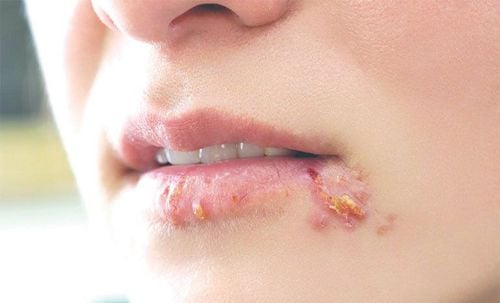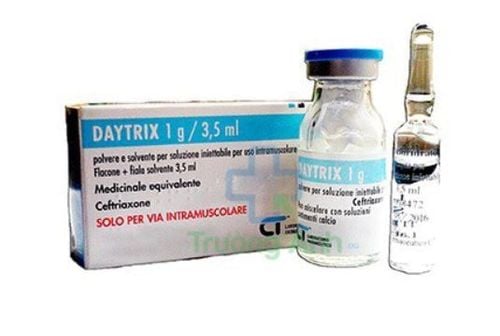This is an automatically translated article.
Syphilis is an infectious disease transmitted primarily through sexual activity, including oral and anal sex. The disease has four stages with different symptoms and characteristics. These stages can overlap, and symptoms do not always develop in the same order. People with syphilis may not even know they have it for many years.
1. Causes of syphilis
Syphilis is caused by the bacterium Treponema pallidum. You can get syphilis through direct contact with the bacterium Treponema pallidum at the sores of syphilis during vaginal, anal, or oral sex. You may see sores on or around the penis, vagina, anus, or in the rectum, on the lips, or in the mouth. Syphilis can be passed from mother to baby during pregnancy.
Syphilis is not spread to others through sitting on toilet seats, doorknobs, swimming pools, hot tubs, bathtubs, sharing clothes or eating utensils.
2. Who is at risk for syphilis?
People with the following factors have a higher risk of syphilis than others:
Having unprotected sex Having many sex partners Being infected with HIV Having sex with people

Quan hệ đồng tính có nguy cơ cao mắc bệnh giang mai
3. The stages of syphilis
The stages of syphilis are called stage 1 syphilis, stage 2 syphilis, latent stage, late stage syphilis.
3.1 Syphilis stage 1
Symptoms of early syphilis usually appear 10 days to 3 months after a person is exposed to the bacteria that cause syphilis. The patient may notice enlarged lymph nodes near the groin.
Usually, the sign of stage syphilis that the patient can see is one or more syphilis chancres at the site where the bacteria entered the body such as the vulva, labia majora, labia minora or cleft palate. head, penis, scrotum. The characteristic of syphilis chancre is a shallow erosion of round or oval shape, on a hard background. The sores will heal on their own after about 3 to 6 weeks, but that does not mean the disease is gone and the patient is about to enter stage 2 of the disease.
3.2 Syphilis stage 2
About 2 to 10 weeks after the first chancre appears, the sick person may have the following symptoms:
A skin rash that causes small, red-brown sores Sores in the mouth, negative Vaginal or anal pain Fever Swelling of glands Weight loss Hair loss Headache Extreme fatigue Muscle pain These symptoms will go away with or without treatment, however, they can last up to a year. Even if symptoms have not returned, the bacteria that cause syphilis are still living in the body.
3.3. Latent Syphilis
If a person does not receive treatment for syphilis in stage 2, the disease can progress to the latent stage. Not everyone with syphilis goes through this stage. If present, people at this stage will not have any symptoms for many years. Because the bacteria that cause syphilis remain in the body, in some cases years later, the latent stage of syphilis can progress to the late stage of syphilis.
3.4 Late stage syphilis
This is the final and most dangerous stage of syphilis. This stage can appear 10 to 30 years after the onset of syphilis infection. People can suffer permanent organ damage and death, such as:
Brain and nervous system problems Stroke Inflammation and infection of membranes around the brain and spinal cord Numbness Numbness Vision problems or blindness Changes personality Dementia Heart valve disease Aneurysm Vasculitis

Với trường hợp mắc bệnh giang mai giai đoạn cuối sẽ có nguy cơ đột quỵ
4. Syphilis symptoms in children
A woman can transmit sexually transmitted diseases (including syphilis) to her unborn baby during pregnancy or to her baby during delivery. Doctors call this congenital syphilis. If left untreated, the fetus is at risk of stillbirth, premature birth, and low birth weight.
Most babies born with syphilis have no symptoms. Some children may develop a rash on the palms of their hands or soles of their feet, but eventually, they can develop complications in multiple organs such as:
Enlarged liver Jaundice Runny nose Swollen glands Bone abnormalities Change brain and nerve symptoms See your pediatrician right away if your child has unusual discharge, sores, or a rash near the groin.
Vinmec International General Hospital offers a Package of Examination and Screening for social diseases to help customers detect diseases early and have effective treatment and prevent dangerous complications. The screening package for social diseases at Vinmec is for all ages, both men and women.
When registering for the Social Disease Screening Package, customers will receive: Dermatology specialist examination; Perform tests such as: HIV Ab rapid test, Chlamydia rapid test, Treponema pallidium rapid test, qualitative and quantitative Treponema pallidum TPHA test, bacteriological smear test and staining fungal test soi...
To register for examination and treatment at Vinmec International General Hospital, you can contact Vinmec Health System nationwide, or register online HERE.
Reference source: Webmd.com; Cdc.gov
SEE ALSO:
Syphilis: Causes, transmission, signs to recognize Syphilis can be transmitted from mother to child through the placenta How is syphilis treated?













